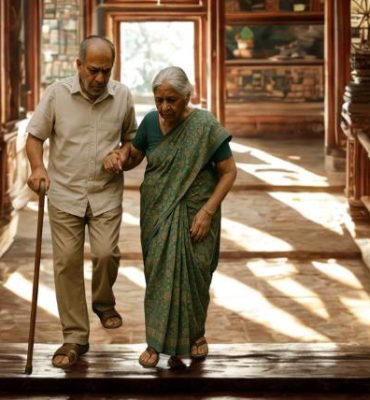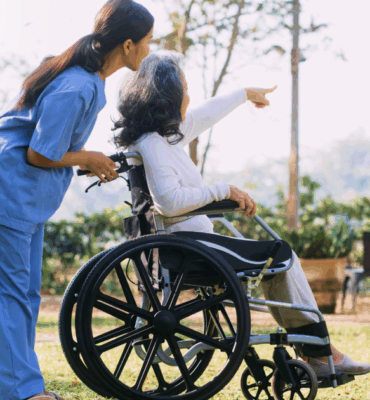
You video-call your parents at strange hours—between deadlines or after midnight in another time zone. On one call, you catch a glimpse of your father’s glasses smudged and awry, and your mother struggling with her words as she tries to explain why she missed her evening walk. It’s then that a subtle, nagging concern creeps in: Is this just aging… or an indicator that something more is amiss? As feelings churn—concern, guilt, that unspoken guilt of ‘am I doing enough?’—you want to be there, but you’re miles away.
If this picture is familiar to you, then you’re not alone.
This emotional picture is the intricate reality for so many, particularly NRIs and working professionals balancing careers, distance, and concern. Nurturing from a distance tends to bring a combination of responsibility and helplessness, where every slight adjustment can resonate as a profound note of concern. Being able to see the indicators that your parents could use professional help is not only logical; it’s the act of love, a representation of your care and attention for your loved ones.
Sometimes, the perfect solution is to bring in trusted, compassionate caregiving assistance for the elderly loved ones in your life so they can live life with pride, and you can be worry-free and get some peace of mind.
In this article, we’ll guide you through:
- How to identify the signs that your parents may need professional eldercare.
- What those signs actually signal for their health, and for your.
- Actions you can take today.
- And, why AgeWell Care is the thoughtful companion your family needs.
Let’s start this conversation… because noticing and respecting those subtle cues may be the greatest act of love you can share with your parents…and with yourself.
The Increasing Demand for Elder Care in India
India’s elderly population is expanding rapidly. By the year 2050, close to 20% of Indians, i.e, some 347 million people aged 60 years and older, will be elderly compared to about 150 million currently.
Currently, professional care is only accessed by a minority of seniors. The senior housing market is currently at only USD 2–3 billion but is projected to reach almost USD 12 billion in 2030, indicating a massive gap and potential.
India’s elderly population is growing rapidly, yet reliable and genuine, and quality elder care has not kept up. Families nationwide are starting to see the need for assistance, whether they are working professionals in urban areas, NRIs managing care from elsewhere in the world, or rural families with no access to nearby services. That’s why knowing about and planning for eldercare has never been so crucial.
10 Signs Your Parents May Need Professional Eldercare
Taking care of parents usually involves noticing little changes in their routine. They creep up unnoticed until you realize they might require more assistance than you can provide. The following are ten significant signs that indicate it is time to look into professional eldercare.
1. Difficulty with Daily Activities
If your parent cannot bathe, dress, cook, or even eat normally, it’s more than a minor inconvenience. These are called Activities of Daily Living (ADLs), and if they become challenging, daily life begins to feel overwhelming.
Why it matters: Seniors may be at risk for poor nutrition, infection from hygiene neglect, or even injury from transferring without assistance.
Real-life Example: Have you ever seen your mother, who used to enjoy cooking, now eat biscuits for supper because it takes too much energy to make a decent meal? This might be alarming.
2. Suffering Personal Hygiene
Overlooked grooming, dirty clothes, or a disheveled look can be subtle but revealing indicators. They most often indicate physical effort, exhaustion, or even incipient depression.
Why it matters: Poor hygiene can lead to infections, skin problems, and emotional distress, affecting confidence and social interactions.
Real-life Example: You notice your father wearing the same shirt three days in a row, something he would never have done earlier.
3. Frequent Falls or Balance Issues
Uncalled-for bruises, difficulty rising from a chair, or reluctance to walk are warning signs. Falls in the elderly contribute to many injuries, and they might also be severe.
Why it matters: A small fall can lead to fractures or protracted recovery times, significantly cutting down on independence your parents and grandparents now enjoy.
Real-life Example: Your parent jokes about “just tripping on the carpet,” but you notice a new bruise on their arm more often than usual.
4. Medication Mismanagement
Skipping doses, doubling up on medicine, or even discontinuing altogether is more prevalent than most know.
Why it matters: Medication mistakes are harmful, particularly when they involve chronic conditions such as diabetes, heart conditions, or high blood pressure.
Real-life Example: You find pill strips sitting untouched in drawers, even when prescriptions were filled weeks prior.
5. Memory Loss or Confusion
Occasional memory loss is normal, but repeated lapses, like missing appointments, misplacing essentials, or getting lost in familiar places, signal a deeper problem.
Why it matters: These could be early signs of dementia or cognitive decline, where timely intervention makes a real difference.
Real-life Example: Your mother calls twice in one afternoon to ask about the same upcoming family event.
6. Weight Changes or Poor Nutrition
Sudden weight loss or gain or a noticeable lack of energy often results from skipped meals, poor diet, or difficulty preparing food.
Why it matters: Malnutrition weakens immunity, worsens health conditions, and accelerates aging.
Real-life Example: The fridge is almost empty except for bread and a few leftovers, far from the variety your parents used to keep.
7. Social Withdrawal or Loss of Interest
If parents avoid religious services, hanging out with friends, or their favorite pastimes, it can’t be “just age.” It’s a sign their mental health is deteriorating.
Why it matters: Isolation can contribute to depression, quicker mental decline, and a drop in the overall mental well-being of elderly loved ones in your life.
Real-life Example: Your dad, who once coordinated family events, now doesn’t take calls and sits by himself.
8. Financial Disorientation
Overdue bills paid, undelivered mail, or reckless spending are usually ignored hints.
Why it matters: It can cause financial stress, susceptibility to scams, and undue anxiety.
Real-life Example: You find you have piling bills for utilities despite having funds in the account.
9. Overlooked Home Environment
What once was a tidy house now has mess, rotten food, or safety risks such as exposed wires and slippery surfaces.
Why it matters: A home that is not safe makes you more prone to falls, food poisoning, and accidents. It also indicates struggles in keeping up with daily chores.
Real-life Example: The sink is full of dirty dishes, and expired food shelves the cupboards.
10. Family Caregiver Burnout
Sometimes, the most obvious sign isn’t with the parent but with you or other family members. Being exhausted, resentful, or perpetually stressed by caregiving duties is a warning signal.
Why it matters: Burnout guarantees care quality will be compromised, regardless of how much you care about your parent.
Real-life Example: You catch yourself easily losing patience or missing your own health check-ups because you’re too busy caregiving.
Why Paying Attention Matters
The above signs can appear insignificant on their own, like a skipped meal here or a missed bill there, but collectively, they can paint a larger picture about your parents’ health. Waiting until a crisis hits, whether it’s a bad fall, a sudden hospital visit, or mental exhaustion for everyone, is a common result of ignoring them.
Noticing these signs in elders ahead of time has five distinct advantages:
Prevention Over Reaction
It catches changes in hygiene, nutrition, or memory before they reach a crisis stage, enabling you to access medical assistance, modify routines, or introduce professional elder care for seniors earlier. This minimizes threats to health and provides your parent with an easier way ahead.
Preserving Dignity and Autonomy
Eldercare isn’t about “taking control.” It’s about allowing your parents to live comfortably and securely without taking away their sense of self. Taking action early on allows you to include them in the decisions, which makes the entire process less daunting and more dignified.
Peace of Mind for Families
For adult children, particularly those with careers, settled far, or families of their own, having your parents supported is a relief. It also prevents caregiver burnout and guilt, which wears on relationships in the long run.
Improved Long-term Planning
Identifying problems early allows families to plan ahead, whether planning finances, investigating care alternatives, or making the home safer. Rather than making hasty decisions under pressure, you can make careful decisions together if you choose the right time to plan the elder care services for your parents and grandparents.
Increased Emotional Bond
When you stay attentive, you’re not just monitoring needs. You’re also spending more mindful time with your parents. This helps build trust, encourages them to share openly, and strengthens bonds during a stage of life where connection matters most.
Noticing these early indicators is not fear; it’s love. It’s seeing when your parents require more than your good intentions, and providing them with the care, security, and fellowship they need.
Start Thoughtful Eldercare Planning in 7 Easy Steps
Caring for your aging parents or grandparents is not just a process. It’s more about compassion and involving that feeling and effort in planning the right elder care for them. You might feel divided between your responsibilities at work or being far away and the small changes you’re seeing at home. That’s absolutely normal. However, ensuring that everything is normal and under control is also a part of the process.
These steps will enable you to continue with consideration and clarity at a pace that is comfortable for the elders you are taking care of, the caregivers, and the entire family.
Step 1 – Observe and Document
Start by observing small changes, like your parent forgetting a dose of medication, being more confused one night, or being strangely withdrawn. A gentle log allows you to see patterns without judgment and provides insights and clarity for any action to be taken.
Step 2 – Have a Gentle Conversation
Find a quiet moment, maybe while sharing tea, and say something like, “I’ve noticed you’ve felt a bit more tired lately, and I’m concerned.” Speak from your heart, not from panic. This is more of a conversation rather than creating tension in their minds and creating unnecessary panic.
Step 3 – Clarify Their Wishes
Ask your elderly parents and grandparents what they feel comfortable with. Do they like assistance with cooking, reminders for medications, or a check-up call during the day? Respect their independence and choices and ensure that decision-making is a team effort.
Step 4 – Assess Needs and Your Capacity
Think about what elder care assistance would be really helpful for them and what you can provide. If you’re already tapped out from work, distance, or other commitments, it’s smart to recognize that. Recognizing your boundaries keeps stress or burnout at bay. This way, you can easily ensure safety and comfort for seniors like your parents and grandparents.
Step 5 – Seek a Professional Evaluation
A visit to your doctor or geriatric assessment will give you insight into what’s causing these signs in older adults, whether it’s health, memory, or some other health issue. It’s an intelligent move toward focused help.
Step 6 – Investigate Eldercare Options
Decide what works best: part-time home care, companionship services, assisted living, or specialized medical care. Select solutions that your parent can accept without compromising their comfort and dignity.
Step 7 – Practice Self‑Care for Yourself
Remember, caregiving may carry emotional baggage. It is all right to stop, seek assistance, or take a break. Counseling, support groups, or dividing the care responsibilities with family members may be the difference-maker.
AgeWell Care Makes Eldercare Simple and Compassionate
Seeing the initial signs that your parents will benefit from professional eldercare is never easy. It provokes feelings like love, concern, guilt, and even questioning the “right” choice. But paying attention and acting sensitively helps keep your loved ones safe, respected, and cared for.
Professional eldercare is not about replacing family. It is about extending your love with the help of trained caregivers who can provide the daily assistance, medical support, and companionship that elders deserve. For families, especially adult children who live far away or juggle demanding schedules, this support can mean peace of mind and more meaningful time with parents.
At AgeWell Care, our job is straightforward. We assist seniors in aging with dignity and support families along the way. We provide customized, reliable eldercare services tailored to the individual’s specific needs, whether that is assistance with daily routines, medical monitoring, or a warm presence in the home.
If you’ve recognized any of these signs in your parents, don’t wait for a crisis to act. Contact AgeWell Care today and let us be your trusted partner in ensuring comfort, safety, and companionship for your loved ones because aging should be filled with dignity, not difficulty.






